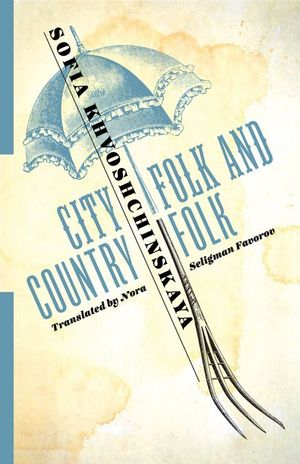City Folk and Country Folk
Published by Columbia University Press
“This scathingly funny comedy of manners” by the rediscovered female Russian novelist “will deeply satisfy fans of 19th-century Russian literature” (Publishers Weekly, starred review).
City Folk and Country Folk is a seemingly gentle yet devastating satire of the aristocratic and pseudo-intellectual elites of 1860s Russia. Translated into English for the first time, the novel weaves a tale of manipulation, infatuation, and female assertiveness that takes place one year after the liberation of the empire's serfs.
Upending Russian literary clichés of female passivity and rural gentry benightedness, Sofia Khvoshchinskaya centers her story on a common-sense, hardworking noblewoman and her self-assured daughter living on their small rural estate. Throwing off the imposed sense of duty toward their "betters", these two women ultimately triumph over the urbanites' financial, amorous, and matrimonial machinations.
Sofia Khvoshchinskaya and her writer sisters closely mirror Britain's Brontës, yet Khvoshchinskaya's work contains more of Jane Austen's wit and social repartee, as well as an intellectual engagement reminiscent of Elizabeth Gaskell's condition-of-England novels. Written by a woman under a male pseudonym, this exploration of gender dynamics in post-emancipation Russian offers a new and vital point of comparison with the better-known classics of nineteenth-century world literature.
City Folk and Country Folk is a seemingly gentle yet devastating satire of the aristocratic and pseudo-intellectual elites of 1860s Russia. Translated into English for the first time, the novel weaves a tale of manipulation, infatuation, and female assertiveness that takes place one year after the liberation of the empire's serfs.
Upending Russian literary clichés of female passivity and rural gentry benightedness, Sofia Khvoshchinskaya centers her story on a common-sense, hardworking noblewoman and her self-assured daughter living on their small rural estate. Throwing off the imposed sense of duty toward their "betters", these two women ultimately triumph over the urbanites' financial, amorous, and matrimonial machinations.
Sofia Khvoshchinskaya and her writer sisters closely mirror Britain's Brontës, yet Khvoshchinskaya's work contains more of Jane Austen's wit and social repartee, as well as an intellectual engagement reminiscent of Elizabeth Gaskell's condition-of-England novels. Written by a woman under a male pseudonym, this exploration of gender dynamics in post-emancipation Russian offers a new and vital point of comparison with the better-known classics of nineteenth-century world literature.
BUY NOW FROM
COMMUNITY REVIEWS

